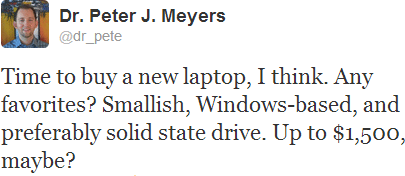Recently, I bought a new laptop. I’ve been in technology for years, and I’ve even built a couple of PCs, but I don’t always keep up with the latest-and-greatest, so I thought I’d ask for help. This story starts with one fateful tweet:

As a parent of two small children, I’ve gotten used to unsolicited advice from random strangers, so I figured: What’s the worst that can happen? Three days later, when I woke up in Tijuana covered in blood and marmalade, I realized my mistake…
The Enthusiastic Advice
Most of the advice I got was as enthusiastic as it was useless, and almost all of it can be collapsed into three major categories:
(1) Buy a Mac!
Look, I have nothing against Apple. I own an iPhone and my wife just bought an iPad Mini. Could you assume for a minute, though, that when I said “Windows-based” I actually thought this through? My desktop PC is Windows-based and my software is Windows-based (some of it, like Adobe Creative Suite, cost a small fortune) – I’m not buying a MacBook just because it’s shiny.
(2) Spend More/Less Money!
One person told me that I couldn’t possibly get a decent laptop for less than $2,500. Not five minutes later, another person told me that I was spending too much and obviously hated poor people and puppies. No amount of math is going to reconcile those two opinions.
(3) Get a Big/Small One!
Likewise, some people told me that the laptop I imagined was either far too big or so ridiculously tiny as to be unusable with my ape-like appendages. The severity of these opinions seemed extreme, given that I never mentioned what size of laptop I was actually considering.
The Fatal Misconception
Most of the advice was well intentioned, but here’s the fundamental problem: No one bothered to ask me how I was going to use my new laptop. Ironically, the most helpful advice I got was from a friend of my dad who outlined exactly why they bought their current, gigantic, desktop-replacement laptop. Even though that’s the polar opposite of what I was looking for, he gave me his rationale and clearly understood that his choice was just that – his choice. So, step one is to figure out what you actually need for your use-case.
The Inevitable Tradeoffs
Step two is to realize that buying a laptop is like buying a car—there are always trade-offs. If you want a high-performance vehicle that does 0-100 in 4 seconds, it’s not going to get 50 MPG, at least not for $20K. We’d all like a laptop that weighs in at half a pound, has a 21-inch monitor, fits into our pocket, and costs $99, but it doesn’t exist. Some combinations are just physically impossible, some are technologically impossible (at least today), and some are possible but will double the price tag. You’ve got to decide not only what you want, but how important it is to you.
The Critical Decisions
For the purposes of this post, I’m assuming that you’d rather shoot yourself in the own leg than have an extended conversation with a Best Buy employee, so I’m going to break your choices down to what I think are six critical decisions you’re going to have to make:
(1) How Much You Got?
Not to ruin your early shopping euphoria, but some of those laptops you’re eyeing are going to end in divorce. We all have a budget, and it’s time to put on your big kid pants and figure out what’s left in the pockets. The good news is that you can get a lot of laptop these days for under $1,000, but the lower you go, the more the tradeoffs kick in.
(2) PC or Mac?
Let’s be brutally honest. The practical upshot of all of the Apple-copying the last few years is that there are a dozen brands of laptops that look like MacBooks (waits for angry comments in 3… 2…). You know what the main difference really is? It’s the operating system and the software that runs on it. Which one you prefer is up to you. If you want to make the switch either direction, that’s great, but factor in the switching cost. You’ll have to learn a new system, and you’ll have to buy new software. You’re a grown up, so I leave it up to you.
(3) How Big Is Too Big?
It’s easy to fall prey to the siren song of the new ultra-books, but even the highest-end, ultra-portable laptops have tradeoffs. My dad’s friend is a great example of why there’s no one right answer to this. He and his wife tend to need high performance and a large screen. Ultra-books are small and have small screens—that’s just a fact of physics. On the other hand, if you fly to exotic locales (e.g. Cleveland) 3 days/week, a 15-pound laptop probably isn’t your best choice. It all boils down to one simple question: How are you going to use it?
One minor warning from my recent experiences: Keep in mind that many ultra-books and very small laptops don’t have internal CD/DVD drives. Most software is downloadable now, and you can always buy an external drive, but some people still have a ton of old software or like to watch movies or even listen to CDs on their laptop. If you’re one of them, then the latest ultra-books may be a non-starter for you.
(4) Do You Like it Sexy?
Let’s face it, we’re vain. I like to think of myself as a practical guy, but I still can’t bring myself to buy a Lenovo (formerly ThinkPad). You know why? It looks like the obelisk from 2001: A Space Odyssey had a baby. Wait. No, that sounds cool. It looks like someone spray-painted a brick matte black and then carefully ran over it with a steamroller. It’s just not sexy, and I can’t get past it. At 42, I don’t need to be seen with my laptop pretending to work on my “novel” at Starbucks, but I do need a little sexy in my day.
You may very likely end up buying your laptop online, but take my advice—visit a store and get one in your hands. A laptop is something you hold and using it is very visceral. Some actually feel too light to me, or a bit flimsy, or the keyboard is weird, or the screen is at a strange angle. Even if it looks great, it might just feel wrong. Find out who stocks the model you’re considering and take a drive there. Even previously online-only brands like Dell are available in stores now.
(5) Where’s The Plug?!
If you’ve got easy access to a power outlet, then battery life may not be a big concern. If you’re a road warrior, though, you’ll need all the juice you can get. Unfortunately, battery life ratings on most laptops are notoriously unreliable and vary wildly, but a large, high-powered laptop is going to burn more power, on average, unless you’ve got multiple batteries. Some laptops offer extended batteries, but they weigh more.
(6) Hard or Solid?
I’ve tried not to focus on any single piece of technology, but there’s been one major advance in the past few years that’s worth mentioning. The classic, mechanical HDD (Hard Disk Drive) is being replaced in some high-end laptops with what’s called an SSD (Solid State Drive). An SSD is a lot like flash memory (think USB stick drive). The big advantage is that SSDs have no moving parts and burn significantly less battery life. The disadvantage is that they cost a lot more per GB of storage. If you want performance and battery life, an SSD is probably worth the price. If you don’t care and need a ton of storage, stick to a regular HDD.
(7) How Much GigaStuff?!
I know what you’re thinking. I never told you how many GB of RAM or GHz of processing power you need. Here’s an unpopular opinion: For most of us, the default is enough. If you’re a power user, you probably don’t need my advice. If you’re not, then don’t making buying decisions based on the advice of your power-user friends.
Memory and CPUs gets cheaper every month, so buy what you need. My philosophy is that I’d rather buy a $1,500 machine every 2-3 years than a $3,000 machine every 5 years. No matter what that $3K could buy me today, it’s still going to be obsolete in a year. So, buy what you need.
The Unfortunate Truth
One truth is undeniable: No matter what you choose or how much money you spend, your new laptop is going to look like a Nick Nolte mug shot next to whatever hits the market in six months. Buyer’s remorse is unavoidable, so stop worrying so much. At the end of the day, a laptop is a tool, and you’re the one who has to use it.
Your friend’s solid gold, Limited Edition Avengers Mjolnir replica hammer may look cool, but it’s not going to be very handy in a house built with Phillips head screws. Most of the time, it’s just going to be you and your laptop, fighting together to get the job done. Make the best choice for you and learn to love it. If you make the right decision for you, it may not last forever, but at least no one has to die.



